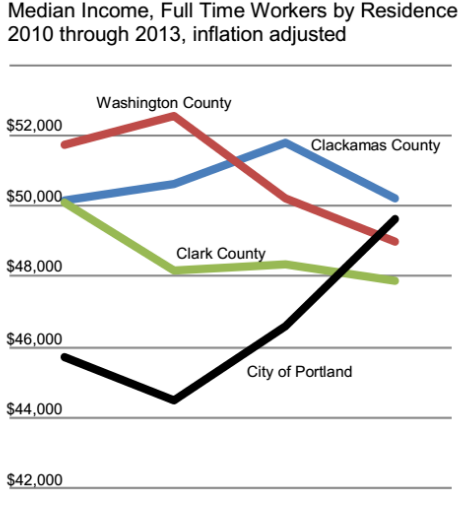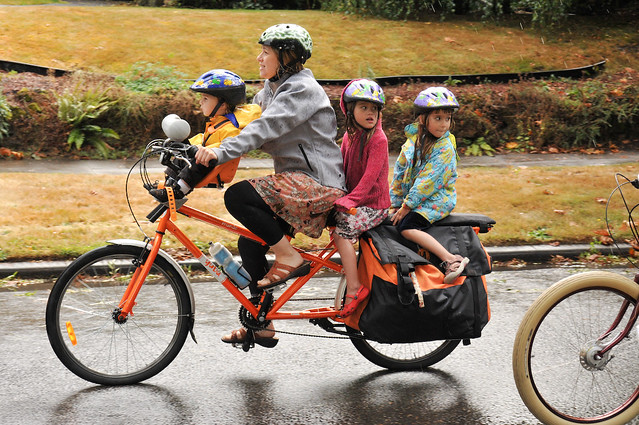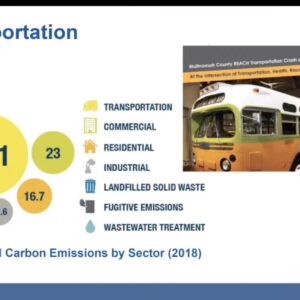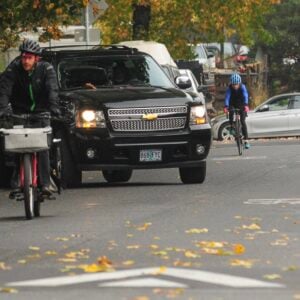The Great Recession has left plenty of marks on the Portland area. Here’s one of the happier ones: so far, at least, a lot of the cars aren’t coming back.
The number of registered passenger vehicles in Multnomah County peaked in 2007, a review of 16 years of state records shows. After the economy began shrinking in early 2008, passenger vehicles per resident started a rapid slide, landing 9 percent lower by 2012. Finally, in 2013 and 2014, the local economy began a relatively rapid rebound out of one of the sharpest local downturns in the country.
But in those two years, the number of vehicles the average Multnomah County resident registers has edged back up just 1 percent.
The story is similar in Washington County, where car registrations per capita fell 5 percent from 2007-2012 with a 1 percent rebound over the two years that followed.

Nationally, and also in Clackamas County, the ratio of cars to people fell by about 3 percent from 2007 to 2012. In Clackamas, too, the car ratio is up 1 percent from 2012 to 2014.
Advertisement
The latest vehicle registration totals for 2014 were circulated by Washington County last month.
Interestingly, Multnomah County’s persistently low ratio of cars to residents (for the area, that is) barely seems to have been affected by its influx of jobs and higher-paid residents. As of 2013, the median income of a Portland resident has raced past Washington County’s:

Because the population of all three counties keeps growing — Washington and Multnomah counties by an average of about 7,500 people each year, Clackamas by about 3,500 on average — the number of cars in each county has grown in the last few years, too. But even with all that growth, Multnomah County still has fewer registered cars than it did in 2007.
“When Baby Boomers retire, they reduce their vehicle travel by half, and then each year they reduce their travel a little bit more.”
— Todd Litman, Victoria Transport Policy Institute
I asked Todd Litman, the transportation researcher who operates the Victoria Transport Policy Institute, why this might be happening.
“Many of the factors are structural,” he said. “The aging population is the biggest one. When Baby Boomers retire, they reduce their vehicle travel by half, and then each year they reduce their travel a little bit more.”
Litman thinks that trend has combined with the cumulative effect of better walking, biking and transit information to increase the number of households that share a single car for multiple adults.
“Somebody who 10 years ago would have driven to work is now not only seeing better bicycle facilities and hearing about the importance of healthy lifestyles and getting lectures from their physician about the benefits, but they’re also seeing their neighbors make that shift and it’s a little more socially acceptable,” he said. “And higher fuel prices or parking fees or whatever.”
“When the car breaks down,” he concluded, “they’re not going to replace it.”







Thanks for reading.
BikePortland has served this community with independent community journalism since 2005. We rely on subscriptions from readers like you to survive. Your financial support is vital in keeping this valuable resource alive and well.
Please subscribe today to strengthen and expand our work.
When you factor in population growth, this is really great news.
I’d be cautious about drawing a conclusion that because car registration has gone down, that there are fewer cars on the road in Portland. PBOT traffic counts on the bridges have shown a sustained increase (except in 2007), and the parking issues in the inner neighborhoods should raise your suspicions that something isn’t right here. According to the city police, when they come out to the neighborhoods to report on local crime, about 30% of vehicles currently being driven are neither registered nor insured, citywide. The penalty for having neither is no longer what it used to be – the police hardly pull over people over for it anymore, as the paperwork involved just isn’t worth it, and they have more important issues to deal with, such as murders, rape, pedestrian deaths, etc. They also have no economic incentive – vehicle registration fees ultimately go to PBOT, not the general fund, as part of the gas tax package with ODOT and Multomah County.
Dave
“30% of vehicles currently being driven are neither registered nor insured”
Do you have a link for this? Genuinely curious.
I can’t speak to the non-registered, but uninsured is estimated at 9% in Oregon. See: http://www.iii.org/fact-statistic/uninsured-motorists
Wow – I too would be curious to see the source of that 30% figure. In any case, I’ve changed “ownership” references to “registration” references. Thanks.
Sorry, it was easy to find the report (it’s a pdf), but harder to find a good link to it: (https://www.insurance.ca.gov/0400-news/0200-studies-reports/0600-research-studies/auto-policy-studies/index.cfm#EUV)
You have to scroll down to near the bottom to find it under “uninsured motorists”.
Dave
I’m not registered, but I am insured.
I wonder how much the increased number of vehicles in inner Portland – especially in and around business districts – has something to do with the explosion of restaurants and shops that are attracting people driving in from all over the metro area.
Doesn’t everybody have to scrape together the money to insure and register their car every couple of years just for the tags (even if they let the insurance slide immediately)? Whenever I have owned a car that I was driving, no matter how broke I was, current tags were a minimum requirement.
I’m also skeptical of this data. I know people who have switched from using what was formerly a vacation residence to their permanent home, at least on paper. They spend plenty of time at these homes and will probably retire there, but in the mean time, they are avoiding DEQ fees and Sellwood Bridge fees. They probably have lower auto insurance premiums, too.
I suspect many Portlanders that I know who own second homes in the gorge register their cars there to avoid emissions testing.
Sure, and this is interesting to note, but what would be the theory for why the living-here-but-not-registering-vehicle-here phenomenon would spike in the last seven years? I would have assumed that this would have been similarly true seven or ten years ago, too, or not?
The Sellwood Bridge fee is new. It may not be enough to cause you to reregister a car, but when buying a new car some might opt for avoiding that and DEQ fees by registering it at a DEQ non-test area.
Hasn’t it been around for at least 5 years. I know it was when I first move here in 2010.
It went into effect in September 2010.
Well there you go.
how many could that even possibly account for? 50?
Good question. In the time span we’re talking about the number of registered voters in Hood River (city, not county) went from ~6K to slightly over 7K from what I understand. Certainly not all from Portland area of course!
Also, up until 2009 you were able to sell a house (as a married couple) and take $500K tax-free, which also aligned with the boomer population becoming empty nesters and interest rates dropping radically (leading up to the 2008 financial crisis, yadda yadda). So… lots of Californians flushed with cash moving into and buying up Oregon, FWIW.
So true. When my car was up for license renewal last fall, it wouldn’t pass emissions, so I sold it. Wasn’t using it for anything but camping trips anyway so it didn’t make sense to pay money to fix it.
Drive an EV. Zero emissions, no testing required. I just registered and switched my ugly Hawaii plates for one of those cool blue Share the Road OR plates.
“Drive an EV. Zero emissions”
You keep asserting this. But when I link to an article that relies on a National Academy of Sciences study that disputes this claim you change the subject. Perhaps you could allow that an electric vehicle is nowhere near zero emissions, and by some estimates is actually worse environmentally than an internal combustion automobile, never mind all the other ways of getting around that this tiresome comparison elides.
Link again, FWIW:
http://spectrum.ieee.org/energy/renewables/unclean-at-any-speed
Good point, but to be fair that report is from 2010. Seems like EVs are changing pretty frequently in their infancy.
From your (rather old) citation:
“Dozens of think tanks and scientific organizations have ventured conclusions about the environmental friendliness of electric vehicles. Most are supportive, but a few are critical. ”
a few
Another advantage of my Leaf over your Trans Am: it’s quieter! Although, while backing up it emits a nice “beep – beep – beep….” – to warn pedestrians and cyclists. My Leaf loves bikes -it’s the Official Car of BikePortland.org!
C’mon, don’t be such a grouch. The technology is in its infancy. With better recycling and cleaner batteries, EVs ‘gonna rule!
“don’t be such a grouch.”
As long as your such a Pollyanna on EVs, someone’s got to be the grouch, rain on your party.
“The technology is in its infancy.”
Hardly. Automobility is in the twilight phase. EVs are a last gasp.
“With better recycling and cleaner batteries, EVs ‘gonna rule!”
Yep. The breakthroughs are always just around the corner.
Yes this data clearly shows autos in their death spiral…..
Are you saying cars are not on their way out? And if so, on what basis would you make that case?
(a) the observed declines in driving and auto ownership to date do not indicate a sea change in our attitudes toward private autos;
(b) the end of cheap oil is not around imminent;
(c) climate change, which requires that we leave most of the remaining fossil fuels in the ground, unburned, does not impact the future of automobility
Or perhaps there are other reasons not listed?
The difficulty is that only vehicle registration statistics are kept, but we don’t know the actual number of vehicles actually on the road, neither nationally nor locally – no one it seems keep tabs on this. Back in 1999, Lyn Hunstad of the California Dept of Insurance did a widely-cited study to estimate the rate of non-registration in California, and came up with an estimate of 28% of vehicles were not registered. They tend to be older-model cars and trucks, often sold person-to-person (now on Criagslist). According to the study, the rate has varied from 28% to 31% over a six-year period.
Mind you, this is in California, 15 years ago. I’m sure Oregon has a much lower rate of non-compliance in these enlightened times of ours.
The 9% uninsured rate cited above was for registered vehicles only. There is also an “under-insured” rate, which is usually 3-4% in most places. No one has any idea what the insurance rate is for unregistered vehicles, but it can’t be very high.
If you are referring to the paper:
http://tinyurl.com/ogtwn8z
“about 30% of vehicles currently being driven are neither registered nor insured” does not accurately present the findings of that paper.
Estimates of the percent of operating vehicles that were not registered back in California circa 1999 ranged from 3% to 12% depending on methodology. See page 46 of that paper. Frankly, none of the estimation methods used sounds very reliable. Today’s technology would allow a much better estimate using a direct count. Use video cameras on an intersection or bridge, through software count the license plates with current and non current tags.
My husband and I have never driven much and had only one car for 20 years. We got rid of it a year and a half ago mainly because driving in Portland started making us insane (starting around 2008). I wonder if that’s the impetus for others? The sheer unpleasantness of driving around here now. My sister’s been carless pretty much her whole life. Because we’re all lucky to be fairly close in now, we mainly bike, walk, take TriMet, and rent a car when we really need one (ZipCar, mainly, and rarely). We did when we lived further out, too–much more difficult prospect! As it is now, we haven’t had to miss having a car at all, knock on wood.
Very interesting statistics. It would be interesting to find out how many inner city families have two or more cars vs suburban families, and how many have none.
Or what about how much the average family in each area spends on transportation? It is the bottom line, after all. Higher average income with lower transportation costs means more money for other things you need or want.
Low income plus high transportation costs equals a working poor person living in East Portland or Cully, where transit service is terrible when it exists at all, and transit doesn’t get you to your industrial job in northern Portland, Gresham, Clark County, etc, and it certainly isn’t reliable nor gets you there in time for your grave-yard shift. Chances are, the folks not paying for registration can barely make ends meet as it is.
Many illegal residents wanting to stay below the radar are driving. Sorry if that ruffles feathers but it’s true.
It isn’t just “illegals”, it’s also many of the homeless who live out of their cars/trucks/vans/campers (no address makes registration & insurance awkward); people trying to “get off the grid”; and anyone who is hungry enough to not have health insurance or renters insurance and gets behind on rent, let alone pay for auto insurance and registration. And, of course, those who choose not register for any other reason or delay (forever) their registration renewal or transfer to Oregon. Why register your car when your bike doesn’t need to be?
If only we could make some kind of law that would allow them to get some kind of license……
What if we had a ballot measure to allow just that….democracy is funny that way
Having no or expired tags on your car is a really, really bad way to “stay below the radar.” Care to back up your assertion with evidence?
What about the abandoned and non-registered cars? I often see this one particular car driving around for the past several months on a regular basis with a California plate.
Student?
Typically they don’t register in the state they’re living in because they aren’t actually residents.
Here in California we see lots of Oregon plates; OR laws allow you to title and register a car in Oregon if used there for 6 or more months per year. One neighbor I talked to says he’s just registered through his kid’s address in Corvallis (OSU student) to save money. There’s actually a hotline advertised here to report out-of-state license plates, and the AG’s office says it’s a crime that results in millions of dollars of unrealized revenue here.
Thank you Michael for this. I have an on-going bet with someone about congestion and auto registration. He has been waiting for these numbers and it seems he will need to take me out to lunch.
Michael, how does the average # of registered cars per resident data compare with the total # of registered cars data? This article seems to imply that there are fewer cars on the road today than 5 years ago, which doesn’t seem possible when population growth/influx is taken into account. How many more cars are registered today than in 2008?
Actually, there are fewer cars registered in Multnomah County today than there were seven years ago even with the population increase. That’s how big the drop has been in ownership per capita! You can see the exact numbers in this spreadsheet, which is also the first link in the post above.
https://docs.google.com/spreadsheets/d/1nCDDylBm5VVTYeZcBH5ElOAa9T21bSrCEXlcBSpRm4o/edit?usp=sharing
Thanks for sharing the data, it’s interesting. Any idea how we can track commercial and fleet vehicle numbers operating in our city and tri-county area? Many of the trucks that are operating in my neighborhood seem to have trailer license plates from Oklahoma and the old tractors hauling them seem to be from rural areas or are hard to identify.
It seems like traffic congestion is much worse than in the past, even though the registered private vehicle ownership is down in one county and more or less flat in the other two (and slightly up statewide).
Here’s the 2014 registration totals for all vehicle types, also linked above. I compiled the past years by googling the title of the document, “filetype:pdf” and each year I was targeting. The filenames keep changing format so you can’t just hack the URL, unfortunately.
http://www.oregon.gov/ODOT/DMV/docs/stats/vehicle/2014_Vehicle_County_Registration.pdf
Is that Emily with the 3 kids in photo ?
Even with these lower ownership trends (good news that it is for urban areas) there are still often more “cars” than “voters”…and this often seems to be what wags the dog ….when it comes to policies, practices, land use and transportation investments.
And as such the demographics of voters who vote are likely to skew to car ownership and probably higher VMT and units registered per voter. (No current sources, just professional hunch.)
Quote from the article: “Because the population of all three counties keeps growing — Washington and Multnomah counties by an average of about 7,500 people each year, Clackamas by about 3,500 on average — the number of cars in each county has grown in the last few years, too. But even with all that growth, Multnomah County still has fewer registered cars than it did in 2007.”
Please explain how you know there are more cars in Multnomah county if you know there are fewer registered cars. If that is the case, it sounds like families with 2 cars are letting one sit unregistered. People don’t do that without a reason.
Your chart showing rising wages is only for full-time workers. Since the recession, many of the new jobs created have been part-time so even though full-time wages may be going up, for people who used to have a full-time job but now have a part-time job, their income has probably fallen by A LOT.
For many folks in America, times are not good:
http://www.washingtonpost.com/local/happy-days-no-more-middle-class-families-squeezed-as-expenses-soar-wages-stall/2014/04/26/f4a857f0-7a47-11e3-b1c5-739e63e9c9a7_story.html
For most of us, it could get worse:
https://www.youtube.com/watch?v=bmB5SHHvnJU
Go ahead and laugh at the above video. That’s what they did to this guy in 2006 even though his main points did occur. People who didn’t believe him can be seen telling why he is wrong starting at 56:20:
https://www.youtube.com/watch?v=jj8rMwdQf6k
If you’d like to see what can happen if you continually vote for Democrats for decades take a peek: (This is just one city – there are plenty of others in similar condition.)
https://www.youtube.com/watch?v=MvJ204yJ3q0
Moral: be cautious in thinking that fewer cars is a good thing.
Quote: “You can see the exact numbers in this spreadsheet, which is also the first link in the post above.”
Per the data, # of cars registered in MC bottomed in 2012 and is rising slowly again. Thus the title of the article is false advertising.
Quote from the article: “Because the population of all three counties keeps growing — Washington and Multnomah counties by an average of about 7,500 people each year, Clackamas by about 3,500 on average — the number of cars in each county has grown in the last few years, too.”
Sentence above contradicts the title of the article which says the number of cars isn’t rebounding, but your own data shows it has been rebounding since 2012, just not very fast. Need to add the words “very fast” to the title of the article.
This article may explain why there are fewer cars with greater population. As usual from zerohedge the comments are priceless.
http://www.zerohedge.com/news/2015-03-07/amazing-math-bls-how-america-added-17-million-jobs-7-years-and-zero-full-time-jobs